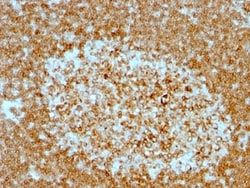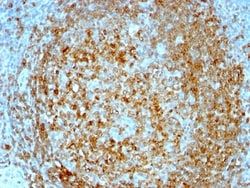CD74 Antibody (LN-2 + CLIP/813), Novus Biologicals™
Manufacturer: Fischer Scientific
Select a Size
| Pack Size | SKU | Availability | Price |
|---|---|---|---|
| Each of 1 | NBP24499201-Each-of-1 | In Stock | ₹ 47,704.00 |
NBP24499201 - Each of 1
In Stock
Quantity
1
Base Price: ₹ 47,704.00
GST (18%): ₹ 8,586.72
Total Price: ₹ 56,290.72
Antigen
CD74
Classification
Monoclonal
Concentration
0.2mg/mL
Dilution
Flow Cytometry 0.5 - 1 ug/million cells in 0.1 ml, Immunohistochemistry-Paraffin 1 - 2 ug/ml, Immunofluorescence 1 - 2 ug/ml
Gene Alias
CD74 antigen, CD74 antigen (invariant polypeptide of major histocompatibility complex, classII antigen-associated), CD74 molecule, major histocompatibility complex, class II invariant chain, DHLAGgamma chain of class II antigens, HLA class II histocompatibility antigen gamma chain, HLADG, HLA-DR antigens-associated invariant chain, HLA-DR-gamma, Ia antigen-associated invariant chain, Ia-associated invariant chain, Ia-GAMMA, Ii, MHC HLA-DR gamma chain, p33
Host Species
Mouse
Purification Method
Protein A or G purified
Regulatory Status
RUO
Primary or Secondary
Primary
Test Specificity
It recognizes a protein of ∼35kDa, identified as CD74. It is a type II transmembrane protein which binds to the peptide binding groove of newly synthesized MHC class II alpha/beta heterodimers and prevents their premature association with endogenous polypeptides. CD74 is expressed primarily by antigen presenting cells, such as B-lymphocytes (from before the pre-B cell stage to before the plasma cell stage), macrophages, and monocytes, and many epithelial cells. Anti-CD74 stains predominantly germinal center lymphocytes and B-cell lymphomas, but rarely T-cell lymphomas. Anti-CD74 has been shown to be useful in differentiating atypical fibroxanthoma (-) from malignant fibrous histiocytoma (+).
Content And Storage
Store at 4C.
Isotype
IgG
Applications
Flow Cytometry, Immunohistochemistry (Paraffin), Immunofluorescence
Clone
LN-2 + CLIP/813
Conjugate
Unconjugated
Formulation
10mM PBS and 0.05% BSA with 0.05% Sodium Azide
Gene Symbols
CD74
Immunogen
SU-DHL-4 lymphoma cells (LN-2); Recombinant full-length human CD74 protein (CLIP/813)
Quantity
0.1 mg
Research Discipline
Immunology
Gene ID (Entrez)
972
Target Species
Human
Form
Purified
Description
- Ensure accurate, reproducible results in Flow Cytometry, Immunohistochemistry (Paraffin), Immunofluorescence CD74 Monoclonal specifically detects CD74 in Human samples
- It is validated for Flow Cytometry, Immunohistochemistry, Immunocytochemistry/Immunofluorescence, Immunohistochemistry-Paraffin.



